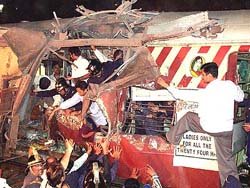
Bom(b) bahia
It is called a city that does not sleep. Now that is completely true. Mumbai does not sleep. What it does is snooze. Whenever she can, this lovely conjoined mass of land takes a break from whatever she’s up to and catches a quick forty winks. Her dwellers are equally busy. They do not even pause to breathe.
What used to be home for scores of fisher-folk is now home for people from all over the world. This cultural and economic hub attracts migrants from far-fetched places owing to its capacity to churn out jobs and accommodation for all of them. No wonder the political parties create a hullabaloo about people of the state not getting jobs as they were being given to outsiders. Known for its semi- extremist antics, a powerful party had propagated a campaign to drive away a certain minority group from the city. How much ever the people wax eloquent about the diverse culture and warmth of the place, tiny blobs of bitterness and unrest in the form of insensitivity and intolerance remains.
The city was called Bombay for much of the last four hundred years during which the British reclaimed lands from the sea and linked the seven distant, distinct. Islands that they were, into one large mass. The origin of the name is obscure, but is often said to come from the Portuguese phrase bom bahia meaning "good bay". The name Mumbai has been used in the main local languages for as long, and is ascribed to the local goddess, Mumba (aai means mother in Marathi).
The city is known for its heritage structures, which are of more interest to tourists than to the citizens. It is only when some odd cameraman frames a monument that people acknowledge the presence of such a structure. Eroded with time and weather and covered with multiple layers of bird droppings, these structures stand as examples of our shamelessness. A few lucky statues of important leaders get cleaned and polished as their anniversaries arrive! The variety in foodstuffs available is splendid too. Cuisines from all over the world are enjoyed with relish. With the dock nearby, fresh sea-food is brought into the markets daily. Vegetables are driven in from distant states. Mi
 grant dishes have become routine components of tiffin boxes.
grant dishes have become routine components of tiffin boxes.Here, it is a constant fight for space- the only thing that people here are short of- after time and money of course! The basic backbone- the transport system of the city, also called as its lifeline are the suburban trains. Commuters from far-off places bravely venture into these electric centipedes and travel for roughly two hours to their respective places of work and back home. Comfort zones get trampled upon, as they adjust and adapt to situations more favourable to them. Pushes, shoves and obscenities become a part of this unique experience. For most commuters the novelty has worn off. It is but a daily matter for them now.
News stories fight for space in newspapers. Film stars and business tycoons fight for photo- space in the media. Unlucky migrants fight for space to rest in. Even in tough conditions like these, good samaritans are generously sprinkled in the city. Ever ready to lend a helping hand- be it helping someone pick up fallen things or guiding blind people safely, they are there always without expecting anything in return. The floods that hit Mumbai last year proved to be the best example of this warmth. As people lay tired on railway stations, citizens got together to provide food and water to them. These teams also got together and collected clothes for the unlucky ones whose houses got washed away. A few do good things. The goodness follows, begets more. It spreads. Such is the magic of Mumbai.
Yesterday, that very magical city experienced yet another bout of shockers. Seven bombs exploded in local trains at peak hour, when scores of Mumbaikars were returning home after a busy day. Exactly four hours later, the railways sprang back to life amid the cheers of a hundred commuters. Such is the magic of Mumbai!

No comments:
Post a Comment